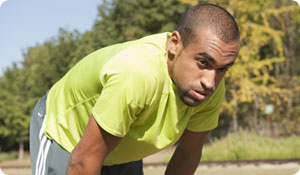
You may jog or take exercise classes regularly to help look and feel your best. But if you're one of the few people who suffer from exercise-induced anaphylaxis, participating in strenuous activities can put your health at serious risk.
While exercise-induced anaphylaxis is quite rare, researchers believe that some type of a food allergy is probably to blame. This means that you aren't likely to experience an anaphylactic attack every time you're active, but likely after you've had something to eat or drink that, when coupled with exercise, sets off a chain reaction.
Possible Theories
The medical community doesn't fully understand exactly how the food allergy and exercise connection occurs, but one possible theory is that when you exercise, the activity changes the way your body digests the food. As a result, you can be exposed to higher levels of proteins that spark a reaction.
Signs of Exercise-Induced Anaphylaxis
If you suffer from exercise-induced anaphylaxis, it's important to recognize the signs, which can occur anytime within a few minutes of starting to exercise to about a half hour in. These include:
- Large hives (a centimeter or more)
- Asthma symptoms, including difficulty breathing
- Nausea, dizziness, light headedness, and headache
- Swelling of the throat
- Drop in blood pressure
- Loss of consciousness
If you believe you're having an exercise-induced anaphylaxis reaction, you'll need to use an EpiPen® and summon emergency medical treatment immediately.
Are You at Risk?
If you have severe food allergies and think you could be at risk for exercise-induced anaphylaxis, it's important to talk to your doctor about the best way to protect yourself. If you can pinpoint the food that could be prompting the reaction, you'll need to avoid the culprit for 24 hours before you resume exercise. Foods like wheat, nuts, and shellfish can be common triggers, so if you're trying to narrow in on a cause, your doctor may want to see if you could be reacting to any of them.
Exercise Caution
If you do choose to exercise, pay close attention to how you feel; stop exercising and use your medication at the first sign of itching and hives. It's also a good idea to have a partner with you who, in the event of an emergency, can administer an EpiPen® and summon medical care immediately.
Sources:
Castells MC, Horan RF, Sheffer AL. "Exercise-Induced Anaphylaxis (EIA)." Clinical Review of Allergy and Immunology, Winter 1999;17(4):413-24. Web. 16 May 2011.
Hosey, Robert, et. al. "Exercise-Induced Anaphylaxis and Urticaria." American Family Physician. American Academy of Family Physicians, 15 Oct. 2001. Web. 11 May 2011.
"Tips to Remember: Anaphylaxis." American Academy of Allergy, Asthma and Immunology. AAAAI, n.d. Web. 11 May 2011.





